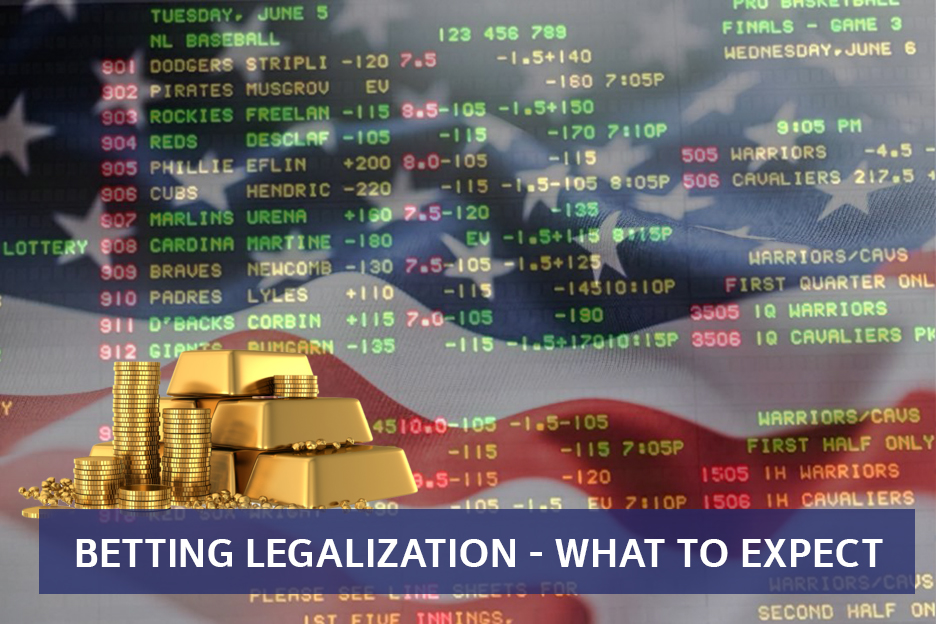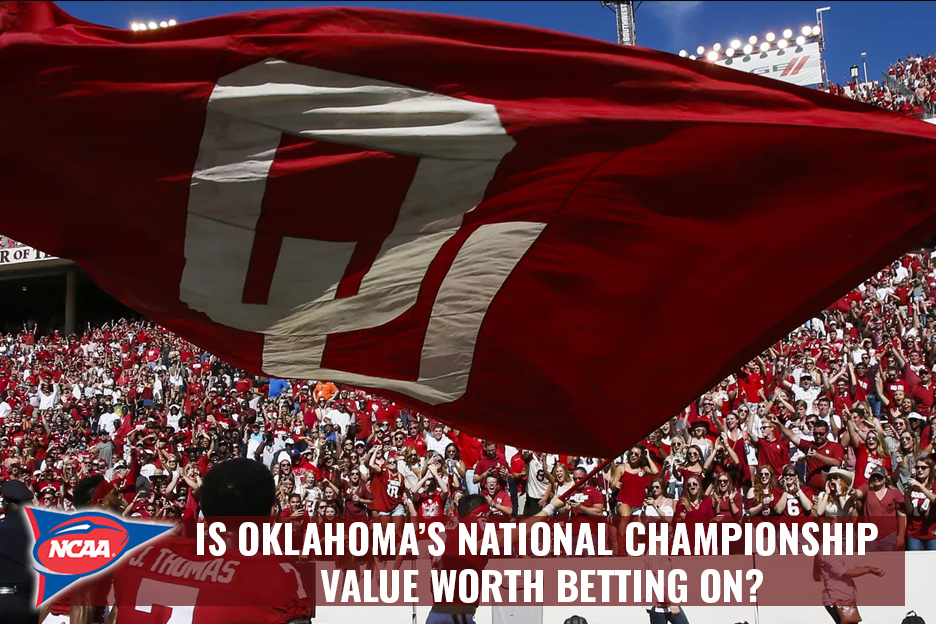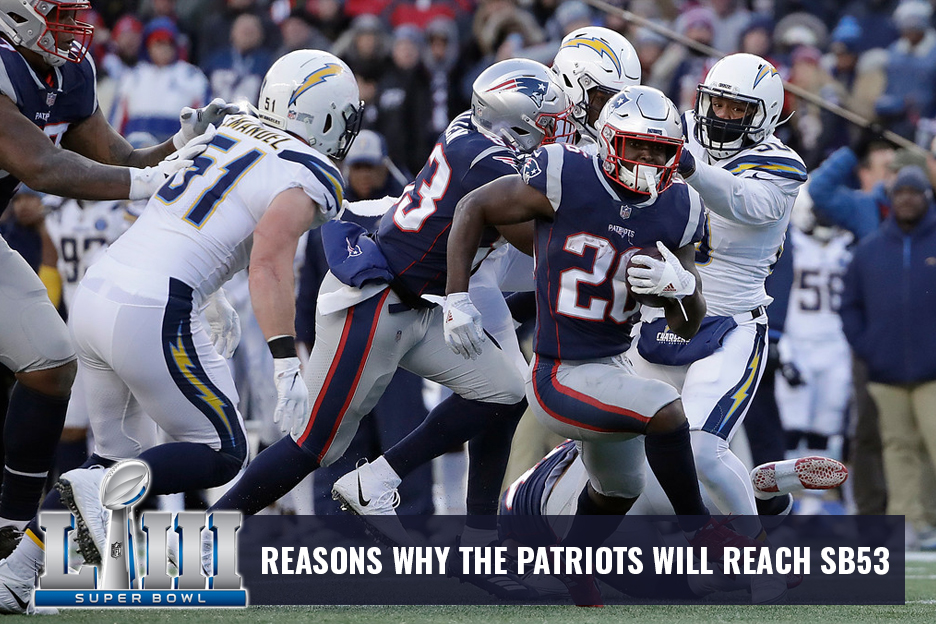

Posted in: General

The phrase “gold rush” is reliably trotted out whenever an emerging industry hits the big time – just ask Bitcoin enthusiasts who bought the pitch hook, line, and sinker last year.
But every so often, a truly lucrative opportunity comes along that deserves the term, and American sports betting legalization is surely one of them.
It all began back in December of 2017, when the United States Supreme Court heard oral arguments as part of the Murphy vs. NCAA case. That case – which was formerly known as Christie vs. NCAA after former New Jersey Governor Chris Christie – stemmed from the Garden State’s many attempts to legalize and regulate sports betting.
Before the high Court heard the case, traditional single-game sports wagers placed through a sportsbook were banned on the federal level in 49 states. Obviously, the Nevada was the one exemption, as it already had legal sports betting when the federal ban known as the Professional and Amateur Sports Protection Act (PASPA) of 1992 was authorized by Congress.
But aside from Nevada’s “grandfather” clause, the PASPA prohibited any state legislature or government from authorizing sports betting regulations. New Jersey had a bone to pick with the PASPA, however, following a 2011 ballot proposition that saw 65 percent of the electorate answer “YES” on the question of whether or not to legalize the industry.
From there, the New Jersey Legislature passed not one but two Sports Wagering Acts, with Christie signing the second into law in October of 2014. Christie’s assent triggered a lawsuit from the NCAA, which joined up with the NFL, NBA, MLB, and NHL to sue the Governor.
According to the leagues, the PASPA precluded any state from authorizing its own sports betting regulations. New Jersey argued that this prohibition violated the Tenth Amendment’s anti-commandeering clause, which prevents the federal government from intruding on states’ rights.
After deliberating, the Court sided strongly with New Jersey in a 6-3 decision which found the PASPA to be unconstitutional.
Nearly seven years after beginning the fight to legalize sports betting, New Jersey had finally secured a momentous victory – not only for itself, but for the 48 other states which are now free to craft their own laws regarding the industry.
In the months since the Court’s landmark decision, four states – Delaware, New Jersey, and Mississippi, and West Virginia- have begun accepting legal wagers.
That list will grow steadily in the future too, as three other states – Pennsylvania, New York, and Rhode Island -have already moved ahead with their own legislation.
The first legal wager in West Virginia was just accepted on August 30, in fact, with a local bettor plunking down $50 at 60 to 1 on the WV Mountaineers to win college football’s national championship.
With the sports betting gold rush moving full steam ahead, many of the gaming industry’s heavy hitters are working to get in on the action. From major casino operators like MGM Resorts and Caesars Entertainment, to iGaming backend providers such as GVC Holdings and International Game Technology (IGT), any company with a stake in the gaming market has been incentivized to include sports betting among its offerings.
On that note, check out the entries below to stay fully informed on all of the latest statewide sports betting developments. You’ll learn about the crossover between daily fantasy sports (DFS) and sportsbooks in New Jersey, online poker titan PokerStars securing a foothold in America for its own sports betting platform, MGM Resorts’ mobile betting app, and two of the latest states to consider post-PASPA regulation.
The Garden State spearheaded the efforts to repeal PASPA, and while the state’s lawsuit was settled by the Court on May 14, it took lawmakers there another month to get legal sports betting off the ground.
But now that the industry has officially launched, it’s growing by leaps and bounds seemingly every week.
The latest milestone was achieved on August 6, when DraftKings – the daily fantasy sports (DFS) kingpin – launched New Jersey’s first online and mobile sports betting platform. By partnering with Resorts Casino Hotel in Atlantic City – one of seven licensed iGaming operators in the state – the Massachusetts-based DraftKings beat major players like MGM Resorts and Caesars Entertainment to market with its online sportsbook.
Chief executive officer and co-founder Jason Robins issued a statement outlining DraftKings’ companywide pivot to sports betting:
We have put immense thought and significant resources behind the development of DraftKings Sportsbook and I’m confident that sports fans in New Jersey will enjoy using it to make the experience of watching the games even more interesting and thrilling.
”Available for both the Android and iOS operating systems, the DraftKings sportsbook app can be accessed through any internet-connected desktop, laptop, smartphone, tablet, or mobile device. The software powering the actual sportsbook operation, such as establishing lines and odds, is being furnished by Kambi, an iGaming provider located in Malta.
Like the states mentioned in the introduction, DraftKings clearly anticipated the Court siding with New Jersey and sports bettors, so the company went work developing its sportsbook offshoot many months ago.
Co-founder Matt Kalish spoke to Legal Sports Report to confirm DraftKings’ yearlong plan to beat the big boys to market:
That was sort of a big bet that the company was making, because we knew the Supreme Court was looking at the case that New Jersey had brought against PASPA. We wanted to be ready in the event that legal, regulated sportsbooks in the US became an option in terms of a product that we could offer.
We wanted to be ready to go as close to day one as possible with the launch of that product.
”And DraftKings isn’t the only DFS operator getting in the game when it comes to New Jersey sports betting.
Back on July 14, exactly two months to the day after the PASPA decision came down, FanDuel launched its first branded sportsbook at the Meadowlands Racetrack. And on opening weekend alone, that Fanduel bet shop accepted more than $1 million in wagers, setting the stage for yet another rivalry with DraftKings.
For their part, DraftKings isn’t content to stop with New Jersey expansion, as evidenced by a spate of high-profile hirings and office openings.
On August 14, the company announced a trio of new hires to round out DraftKings’ corporate sports betting hierarchy. Jamie Shea, Frank Kunovic III, and Sean Hurley have been installed as the site’s new head of sportsbook operations, director of retail sportsbook operations, and head of commercial growth, respectively.
The hiring was timed to coincide with DraftKings’ recent opening of a new office complex in San Francisco, with another in Las Vegas to follow shortly thereafter. The new offices will serve as satellites to help supervise the company’s aggressive strategy to capitalize on emerging statewide sports betting markets.
But even with the developments in New Jersey, California, and Nevada, DraftKings is beefing up its existing Boston headquarters in anticipation of a 75 percent expansion of its local workforce. To that end, a new headquarters clocking in at 105,000-square feet is currently under construction, with opening scheduled for early next year.
The hits keep on coming for Resorts AC, which ranked third out of seven iGaming licensing groups in New Jersey with July revenues of over $3.9 million.
Just days after the launch of DraftKings’ sportsbook, the casino announced an expansion of its existing partnership with The Stars Group, parent company of PokerStars. The global online poker leader already operates PokerStars NJ under the Resorts AC license, but as part of the new deal, it will be bringing its BetStars sportsbook to the state.
The official launch date hasn’t been revealed just yet, but Resorts AC has already filed the necessary paperwork to the New Jersey Division of Gaming Enforcement (NJDGE).
BetStars serves dozens of national markets throughout Europe, but the Resorts AC deal in New Jersey marks the platforms first appearance on American shores.
Matt Primeaux, who works as senior vice president of strategy & operations in the U.S. for The Stars Group, issued a statement celebrating that very fact:
Working with our longstanding partner, Resorts, we are really excited to introduce a brand-new consumer experience by bringing New Jersey fans closer to the sports and the teams that they love.
”Mark Giannantonio, the president and chief executive officer for Resorts Casino Hotel, added his take on the addition of a second online sportsbook under its license:
The Stars Group also secured a partnership with Mount Airy Casino Resort in Pennsylvania that will see both PokerStars and BetStars appear in the Keystone State when iGaming goes live there later this year.
But before BetStars could become the second online and mobile sports betting option in New Jersey, another major industry player claimed that honor for itself.
On August 23, MGM Resorts International issued a press release revealing that PlayMGM – the company’s online betting app in New Jersey – is now accepting sports wagers.
That makes PlayMGM the second online sportsbook to go live in the state, following closely on DraftKings’ heels while beating BetStars to the finish line.
As the owner and operator of the Borgata Hotel Casino & Spa in Atlantic City – one of those seven licensing groups mentioned earlier – MGM Resorts International has already offered online casino games and poker through the PlayMGM app for more than a year now. But the addition of sports betting functionality should help to shore up the Borgata licensing group’s bottom line, which is already quite strong as the second-place revenue performer behind Golden Nugget AC.
In late July, MGM Resorts International also struck a sports betting deal with land-based casino conglomerate Boyd Gaming. As part of that arrangement, the two casino owners will collaborate on sportsbook development in the 13 states (aside from Nevada and New Jersey) where either company maintains casino properties.
And to help finance those efforts, MGM Resorts International also announced a $200 million deal with GVC Holdings, parent company of the Ladbrokes / Coral and SportingBet platforms in Europe. Both companies will put up $100 million apiece to fund the ongoing effort to get in on the ground floor of state-by-state sports betting regulation.
Speaking of statewide sports betting legislation, Indiana is on track to join the party – whether in 2019 or 2020.
Earlier this year, state senator Jon Ford (R – Terra Haute) and state representative Alan Morrison (R – Brazil) of Indiana introduced their own bills seeking to legalize and regulate sports betting.
As the bills were presented before the Court’s decision on PASPA came down, each included wording that made any changes to Indiana law contingent on federal action. But while similar pre-PASPA repeal bills were successfully passed in several of the aforementioned states, Indiana’s lawmakers wanted to take their time.
On that note, the Indiana Legislature opted to delay any vote on either Ford’s or Morrison’s bill. Instead, lawmakers decided to setup a study session over the summer, looking to clarify the finer points of sportsbook taxation, licensing procedures, and other regulatory red tape.
As part of the Legislature’s study, the Indiana Gaming Commission (IGC) contracted with Eilers&Krejcik Gaming LLC, a leading consultant specializing in gaming legislation. The firm will be paid $74,999 over the next two years to provide a full accounting of all relevant “fiscal impact estimates and policy considerations.”
In a public statement, the IGC outlined the intent behind its agreement with Eilers&Krejcik Gaming:
Eilers has conducted a similar study for the West Virginia regulators and we anticipate that Indiana’s report will be similar and hope that it will be completed in time for the interim study committee meetings.
”Following that two-year timeline, Indiana looks to be eyeing 2020 as the earliest possible date for passing a sports betting bill. Even so, both Ford and Morrison have already gone on record as saying they’ll reintroduce their bills beginning with the 2019 legislative session in January.
In an interview with the Indiana Business Journal, Ford confirmed his intention to put a sports betting bill before colleagues in 2019:
We don’t know what is possible until we introduce sports wagering.
”In his own comments to the newspaper, Morrison alluded to the IGC’s interest in establishing accurate revenue estimates before moving forward:
As part of a 2017 sports betting bill sponsored by Morrison – one which sought a tax rate of 9.25 percent on operator revenue – lawmakers were presented with fiscal estimates pegging Indiana’s potential gains at between $3 million and $19 million.
For comparison’s sake, the online casino and poker industry in New Jersey – which levies a 15 percent tax on revenue – tallied $38 million in taxes to the state during 2017. Meanwhile, during the Garden State’s first month of legal sports betting in July, government coffers received $294,000 in taxes from operators using an 8.5 percent rate on land-based wagers and 13 percent for online and mobile bets.
Both Ford and Morrison have signaled that online and mobile betting should be included as a necessary revenue engine in any bill that clears the Legislature.
After experiencing a stalemate similar to that in Indiana – with multiple pre-PASPA repeal bills introduced and shelved during the 2018 session – lawmakers in Kentucky aren’t resting on their laurels.
Back in June, shortly after the Court’s decision to strike PASPA down was rendered, a bipartisan group within the Kentucky General Assembly agreed to form an unofficial panel to study sports betting issues.
That panel includes three state senators and six state representatives, with four Republicans and five Democratscrossing the aisle in Kentucky’s GOP-controlled Legislature:
As part of their work on the panel, the nine lawmakers will seek to iron out the details surrounding a draft bill put forward by McGarvey, Adams, and Nemes. That bill was introduced earlier in August, following three months of study by the panel.
In an interview with the local WAVE-3 NBC news station, McGarvey pointed out that sports betting already takes place in massive volume throughout Kentucky, but only through illicit bookies and unregulated offshore sportsbooks online:
To help sell the legalization effort to fellow lawmakers, McGarvey and his allies are touting revenue estimates that project between $5 million and $60 million annually via taxes and licensing fees.
That curiously large spread is due to a divide on the issue of college sports wagering. While some lawmakers prefer to accept bets on both pro and collegiate games, others hope to limit Kentucky bettors to the pro side only. Thus, a pro-only sports betting industry would fall on the lower end of the revenue spectrum, while a comprehensive menu of offerings would increase revenue in kind.
In his own comments to local media, Nemes expressed concern over consumer protection, as Kentucky bettors are currently left with no resort but to risk their bankroll with bookies and offshore sites:
While we think it’s a good thing to bring to Kentucky because of a lot of reasons, revenue stream, liberty and those types of things, we do recognize it does have some bad components as well so we want to address those at the front end.
”But while lawmakers appear largely onboard with eventually regulating sports betting, the Bluegrass State’s famously vibrant horse racing industry stands out as a potential hurdle.
In previous bills, language was included which directed the Kentucky Horse Racing Commission (KHRC) to “institute a system of sports wagering.” Other bills called upon the state’s Lottery Commission to oversee sports betting regulation, but as Nemes told Legal Sports Report in a recent interview, the current consensus involves the creating of a third agency acting independently of those commissions:
We’ve seen a great deal of sports betting changes recently because of the new laws, and this trend is bound to continue. Only time will tell, but we may eventually see as many legal sportsbooks as casinos.








